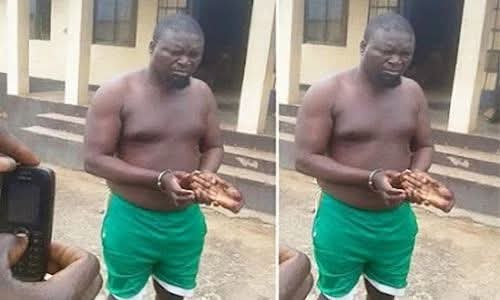Grief, rage, and disbelief filled the courtroom in Iwo, Osun State, on Wednesday, May 28, as Justice Lateef Adegoke pronounced the ultimate sentence on an Islamic cleric, Kabiru Ibrahim — death by hanging — for the brutal and ritualistic murder of a 25-year-old man, Lukman Adeleke.
What began as a simple request for spiritual guidance ended in cold-blooded horror.
According to the case presented by the prosecution, Lukman, a vibrant young man with a promising future, had approached Ibrahim for spiritual consultation over a land purchase. As part of the process, the cleric instructed him to bring the money intended for the land, claiming it needed to be “fortified” through prayers. Lukman complied — but he never returned home.
Days turned into weeks, and his family grew frantic. When confronted, Kabiru Ibrahim denied seeing Lukman in over two weeks. But a local resident shattered his lie, revealing that he had personally escorted Lukman to the cleric’s house the very day he disappeared.
The family immediately raised the alarm, and the matter was handed over to the police. What followed was a series of chilling revelations that left even seasoned investigators stunned. During police interrogation, Ibrahim broke down and confessed. He admitted to killing Lukman and led the police to the Ilesa/Akure expressway. There, hidden away from the world, was a sack — inside it, Lukman’s decomposing body, his palm gruesomely severed.
The court heard how the spiritual session was a deadly trap, with Ibrahim luring his client under the guise of faith. The stolen money was never recovered, but the damage had already been done — a promising life brutally ended, a family left shattered, and a community stunned by the evil lurking behind clerical robes.
Justice Adegoke, in delivering his ruling, described the crime as barbaric and heartless. The court found the defendant guilty on all counts: conspiracy, murder, and theft, in violation of Sections 324, 319(1), and 390 of the Criminal Code of Osun State. While Kabiru Ibrahim received a seven-year sentence for theft, it was the murder charge that drew the ultimate punishment: death by hanging.
The prosecution, led by Abiodun Badiora, presented a watertight case backed by photographic evidence, eyewitness testimony, and the killer’s own extrajudicial confession. Six witnesses were called to testify, all painting a damning picture of betrayal and ritual horror.
Notably, Ibrahim’s defence counsel offered no rebuttal to the prosecution’s final written address — a silence that echoed the cleric’s guilt. With no mitigating circumstances, the court ruled that nothing short of the maximum penalty would suffice.
As the judge pronounced the death sentence, there was no joy in the courtroom — only a heavy silence, broken by the quiet sobs of Lukman’s grieving family. For them, justice may have been served, but the hole in their hearts remains.
This is not just a story of murder. It is a chilling reminder that evil sometimes wears the robes of religion, and that the thirst for money can drive men to the darkest depths of inhumanity.




































